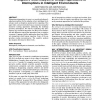Free Online Productivity Tools
i2Speak
i2Symbol
i2OCR
iTex2Img
iWeb2Print
iWeb2Shot
i2Type
iPdf2Split
iPdf2Merge
i2Bopomofo
i2Arabic
i2Style
i2Image
i2PDF
iLatex2Rtf
Sci2ools
CHI
2004
ACM
2004
ACM
A cognitive meta-analysis of design approaches to interruptions in intelligent environments
Minimizing interruptions to users is a crucial and acknowledged precondition for the adoption of new intelligent technologies such as ubiquitous and proactive computing. This paper takes a step toward achieving a consensus among the numerous existing approaches addressing the challenge posed by interruptions. We start by explicating why interruptions are considered important. We then reveal similarities and differences among the approaches from a cognitive viewpoint. It appears that the approaches draw from different assumptions about human cognition. Some of the approaches contain inconsistencies. The cognitive analysis also inspires directions for future work. Author Keywords Interruptions, intelligent environments, user interfaces. ACM Classification Keywords H5.2. User Interfaces: Theory and methods
Approaches Contain Inconsistencies | Author Keywords Interruptions | CHI 2004 | Human Computer Interaction | Numerous Existing Approaches |
| Added | 01 Dec 2009 |
| Updated | 01 Dec 2009 |
| Type | Conference |
| Year | 2004 |
| Where | CHI |
| Authors | Antti Oulasvirta, Antti Salovaara |
Comments (0)

